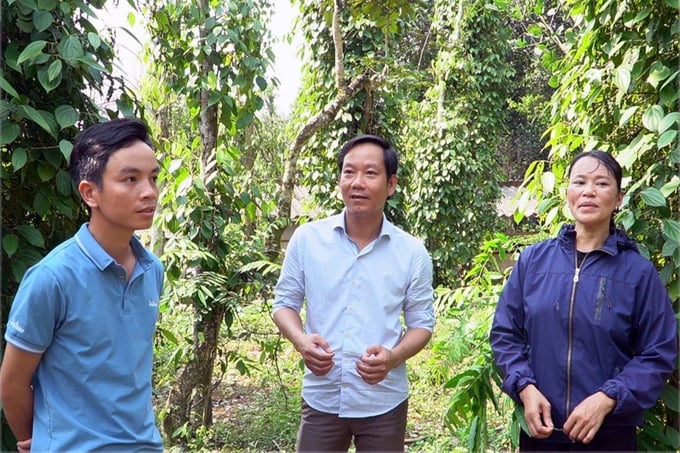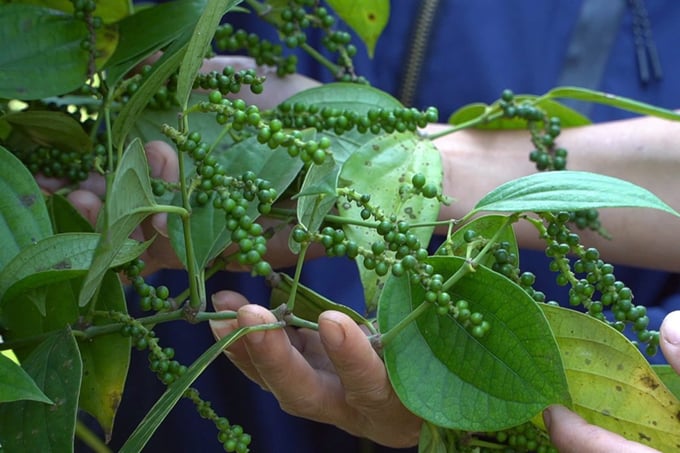June 18, 2025 | 11:06 GMT +7
June 18, 2025 | 11:06 GMT +7
Hotline: 0913.378.918
June 18, 2025 | 11:06 GMT +7
Hotline: 0913.378.918

Pepper is a specialty product of the sun-soaked, windy region of Quang Tri Province. Photo: Vo Dung.
Despite its status as a key crop with expansive production area, Quang Tri pepper is primarily exported via intermediaries with minimal yield. As a result, organic pepper from Quang Tri requires assistance in reaching overseas markets.
Gio An Commune (Gio Linh District) currently houses approximately 80 hectares of pepper production area, including 54 hectares belonging to Ong Voi Cooperative. Notably, the cooperative has received a certification and production unit code for meeting European organic standards. Consequently, the cooperative is eligible for export to demanding markets.
Lam Cong Phi, Director of the Ong Voi Cooperative, reported that farmers have returned to intensive cultivation for the 2024 crop after observing a gradual increase in pepper prices. As a result, the pepper yield in Gio An Commune has nearly doubled compared to its previous crops. The selling price of pepper also climbed considerably, with dried pepper fetching prices ranging from 165,000 to 180,000 VND per kilogram. With this growth momentum, both the production area and yield of pepper in the commune are projected to increase, particularly as more farmers adopt organic farming practices to meet export requirements. Despite the current significant export demand, Ong Voi Cooperative is struggling to gather sufficient product for export.

Quang Tri Province currently houses only 100 hectares of organic pepper production area. Photo: Vo Dung.
"Export businesses are currently purchasing products in bulk to fulfill their orders. We have had to source pepper from other regions, however the quality must meet the requirements of our partners, which limits the amount we can provide," noted Director Lam Cong Phi.
According to Director Phi, Ong Voi Cooperative has the legal standing to directly export organic pepper to Europe. However, one of this market's requirements for agricultural export is the presence of a processing plant. Accordingly, the cooperative can meet raw material requirements by strategically developing pepper production areas based on the available land and farmers' expertise. However, the cooperative's limited support mechanisms prevent the construction of a processing plant.
"A processing plant will be able to solve many of our current problems, improve economic efficiency for pepper farmers, and contribute significantly to the local economy. However, the required investment is too substantial for the cooperative, which is why we must rely on intermediaries for exports. If Quang Tri is able to build its own pepper processing plant, the pepper farming industry will see a significant increase in income," Director Phi emphasized.
Similarly, in recent years, businesses and cooperatives in Quang Tri Province have been exporting organic pepper through intermediaries in Ho Chi Minh City, without the capacity for direct export. Consequently, despite its highly regarded quality, Quang Tri pepper is primarily consumed in the domestic market.

Despite its large production area and status as a key crop, Quang Tri pepper export volume remains limited. Photo: Vo Dung.
Pepper is a key crop in Quang Tri Province. Over the years, the Provincial People's Council has issued multiple policies to support the development of organic pepper for export. However, at present, the province houses only 100 hectares of organic pepper production area, with a limited number of production unit codes available. This limitation has prevented Quang Tri pepper from achieving its expected economic value. Coupled with the absence of local processing businesses, the small organic pepper production area and the limited production unit codes have severely limited export volumes to demanding markets.
"Quang Tri possesses exceptional potential for exporting pepper. However, through intermediaries, the province only exports over 40 tons of pepper to the United States every year. Export volumes are projected to increase marginally in 2024. Local pepper businesses and cooperatives currently lack the capacity to directly export to foreign markets," remarked Bui Phuoc Trang, General Director of the Quang Tri Province's Sub-Department of Crop Production and Plant Protection.
According to statistics, Quang Tri province currently houses nearly 2,200 hectares of pepper, with over 2,000 hectares in production.When pepper prices dropped, several farmers replaced their pepper farms with other crops. In addition to the rising prices following the 2024 crop, pepper yield in Quang Tri has reached 1.25 tons per hectare, which is an increase of 0.07 tons per hectare compared to the previous crop.
Translated by Nguyen Hai Long
/2025/06/17/2344-1-131758_261.jpg)
(VAN) Amid tariff risks and growing trade barriers in the U.S. market, Australia is emerging as a promising destination to sustain the growth momentum of Vietnam's shrimp exports.
/2025/06/17/2013-1-nongnghiep-112009.jpg)
(VAN) This notable growth trend reflects the global taste for fresh, nutritious fruits and the expanding use of lychees across various sectors.

(VAN) The political and cultural insulation of Japan’s beloved grain is falling apart, and experts warn the country’s relationship with the staple will have to adapt.

(VAN) Noting risks, report examines impacts of avian influenza, changing trade patterns since 2022, fish fraud, and shipping industry’s net-zero goals.

(VAN) Mr. Tran Quang Bao, General Director of the Forestry and Forest Protection Department, met and worked with the International Wood Products Association to promote cooperation in the field of timber trade.

(VAN) China's outbound shipments of rare earths in May jumped 23% on the month to their highest in a year, though Beijing's export curbs on some of the critical minerals halted some overseas sales.

(VAN) To sustain capital flow, administrative reform alone is not enough; what farmers truly need is an ecosystem where both government and businesses grow together in support.